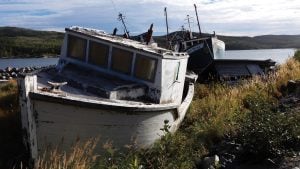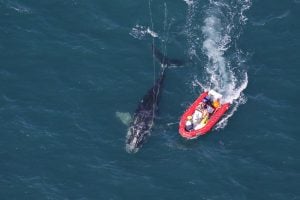
People & Culture
The cod delusion
A moratorium on cod fishing that was supposed to last two years has now lasted 30. What will it take to rebuild cod stocks — and a way of life?
- 3119 words
- 13 minutes
This article is over 5 years old and may contain outdated information.
Travel
Newfoundland’s food scene is having a moment, and local entrepreneurs are capitalizing with specialized tours that offer an insider’s perspective on what makes the Rock so tasty

“You know every Newfoundlander loves a moose…” says Wayne Parsons, pausing just a fraction of a second for comedic effect,
“… when it’s up to its arse in gravy!” The crowd roars and Parsons, who’s providing commentary on a guided catamaran tour of Bonne Bay in western Newfoundland, continues on with a monologue that takes in everything from fishing quotas to the region’s ecology to the secret to preparing the perfect Jiggs’ dinner — a Newfoundland classic consisting of salt beef boiled together with potatoes, carrots, cabbage or turnip.
It’s obvious he loves this land around Gros Morne National Park, but his observations about its landscape and inhabitants remain unpretentious and hilariously on point. This deep pride for their home is something Newfoundlanders have always had, but it has only recently taken root in a new segment of the island’s tourism industry — one that’s showcasing its cuisine to the rest of the world.
Many credit celebrity chef Jeremy Charles, he of the revered Raymonds in St. John’s, for the ever-increasing influx of committed locavores eager to experience the province’s traditional ingredients. Having his establishments recognized twice in the “best new restaurants” issue of enRoute magazine has resulted in national fame for Charles, while also helping spawn a wider appreciation for the island’s food and drink scene.
To experience the real Newfoundland, travellers are getting down and dirty, learning about the history of the fishery as they jig for cod and about traditional canning techniques and simple recipes as they forage for berries that they’ll later make into jams and wild chanterelles that will soon become the best-ever mushrooms on toast.

Darren Park of Four Seasons Tours personifies the new movement. A proud Newfoundlander who has never left the island, this quiet local celebrity has toured and fed renowned chefs, a global array of film crews and hundreds of casual vacationers looking for an authentic taste of the Rock. His summer chariot of choice is an orange and green dory handcrafted by a retired fisherman.
As the dory pulls out of Cox’s Cove just north of Corner Brook and into the Bay of Islands — the water’s a touch “loppy” today, Park warns — a bald eagle appears, soaring lazily overhead before alighting on top of a tall fir on the shoreline. It can spot the dory from kilometres away and knows there’s the possibility of swooping in to grab a fish as it’s thrown back. (An increasing number of Park’s tours are geared to photographers eager to capture eagles in their viewfinders.)
Cast, let the line hit bottom, reel it up five turns, give it a tug. Success is instant. Within a half hour, the crew of four has reeled in three cod, a couple of ocean perch and a nasty looking sculpin. At this time of year, it’s only open season for cod on the weekends, so back they go. No worries, though, as Park has a cooler full of cod in the back of the dory and, when we tire of fishing, we head across the cove to his summer cabin for a classic beach boil-up.
Within minutes, a driftwood fire is burning brightly, a pot of mussels steaming on the grill. Ready almost instantly, they are, quite simply, divine. What’s his secret? “The sweetness of the sea,” says Park. His recipe: fresh mussels boiled in seawater. That simple; that good.
Then it’s into his homey cabin for pan-fried cod, a plate of smoked Atlantic salmon made by one of Park’s friends and a swoon-worthy cod au gratin made by his wife, Anita, with fresh potatoes from their garden. A professional recipe developer on the tour begs for her secrets.
Fresh cinnamon rolls complete the feast. And all the while, there is Park telling his fish tales, making every guest feel at home. “The smiles tell the story,” he says. “Being out on the water and helping someone catch their first fish — that’s what it’s about.”

After a day on the water with Park, the Marble Inn Resort just east of Corner Brook offers up luxury accommodations on the Humber River and a casual-fine dining menu at Madison’s, where the culinary chemistry involves using local and seasonal ingredients to produce inspired takes on traditional Newfoundland cuisine. So, think scallops, but with a grenadine reduction and apple salad; think Codroy Valley lamb, but braised as a masala and served with sumac spinach; think mussels from the island’s west coast, but dished up with spicy Nduja sausage. Then think about saving room for the honey and whiskey mousse.
Meanwhile, at the nearby seaside communities of Norris Point and Woody Point, husband-and-wife team Ian and Rebecca Stone tempt food-focused travellers with insider access to the best of local restaurants through their Taste of Gros Morne tours.
Part of a new wave of food entrepreneurs, they revel in “letting people know where the good places to eat are.” A typical tour is intimate, maxing out at eight people who Rebecca guides through three or four restaurants, highlighting appetizers at one, a main at another, perhaps a dessert at the third. The dishes are resolutely homegrown — delectable lobster dumplings at the Bonne Bay Inn’s Blue Ocean Dining Room, say, or a massive slab of fresh pan-fried cod at super casual The Old Loft Restaurant. “Years ago, if you could get stuff from far away you thought it was fancy,” she says. “Now we’re finally appreciating local.”
“Years ago, if you could get stuff from far away you thought it was fancy. Now we’re finally appreciating local.”

“I have a passion for making things from scratch — to be perfectly honest, I’ve gone a little cracked on it!” Over on Newfoundland’s east coast the foodie trend is just as hot and Lori McCarthy of Cod Sounds is a whirlwind of energy. Both earnest and joyful, she’s a true devotee of local foraging and a passionate advocate for traditional knowledge and recipes.
She’s also a savvy entrepreneur, building a brilliant business that sees her leading beachside foraging and picnic tours in the summer and classes such as fireside cookery and hare hunting in the winter via her Cod Sounds cookery school.
In her spare time, she’s out scouring nearby beaches for fresh ingredients on behalf of the city’s top chefs — pretty sprigs of oyster plant for salads, some spicy sea rocket to pair with fish, intense Scotch lovage and aromatic sweet gale, some bright green gutweed to dry and sprinkle in fresh butter. Her encyclopedic knowledge of these ingredients is self-taught, something she dived into with gusto less than a decade ago, combining book learning with knowledge gleaned from her mother’s and grandmother’s generations.
As McCarthy wanders through a meadow and toward the beach on her Forage & Fire tour in nearby Avondale, collecting bags in hand, tour participants realize they’ll never again tackle a hiking trail in quite the same way. Where before one might have appreciated this blanket thing called “nature,” now eyes scan for dewberries, blueberries, raspberries, bakeapples, rose hips and, if lucky, an undiscovered patch of chanterelles hidden under a downed tree. On a driftwood-strewn beach, there are wild peas and dandelions and edible seaweeds galore. It’s all good fun, with McCarthy keeping up a steady chatter about the land’s bounty and the importance of using traditional ingredients to give Newfoundland cuisine a real sense of place.
McCarthy’s mother, Shirley, waits at the end of the beach, a pot of water on the boil. The open-air feast she and Lori have prepared showcases all that’s making Newfoundland Canada’s food-scene darling. There’s rhubarb tea (into which goes wild mint and rose petals picked by the beach). Fresh garden carrots are cooked lightly over the fire, paired with dill and homemade butter, followed by a platter of McCarthy’s own moose salami with newly pickled bakeapples and beets. Fresh scallops are sliced thin and placed on a hot rock, so they’re cooked just around the edges, dusted with dehydrated scallop roe and salt. There are skewers of moose, from an animal harvested in last year’s hunt. To finish off, a simple partridgeberry dessert loaf. It is, quite simply, the best picnic ever.
Are you passionate about Canadian geography?
You can support Canadian Geographic in 3 ways:

People & Culture
A moratorium on cod fishing that was supposed to last two years has now lasted 30. What will it take to rebuild cod stocks — and a way of life?

Travel
Ice fishing during an extreme cold warning on the wind-whipped south shore of Lake Winnipeg may not sound like a fun time, but editor Aaron Kylie thinks otherwise

Wildlife
The death and entanglement of 17 of the endangered mammals last summer spurred an unprecedented effort to make the Gulf of St. Lawrence safer — but will it be enough?

Travel
A northern Ontario lake sets the stage for a father-and-son fishing trip